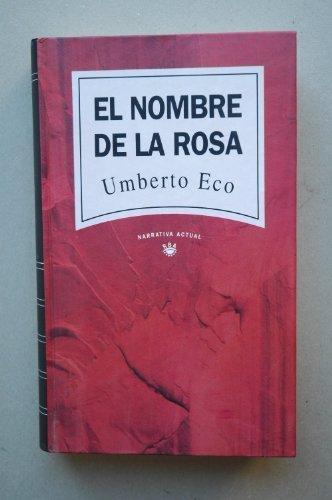marapavelka@books.theunseen.city reviewed Jméno růže by Umberto Eco
Review of 'Jméno růže' on 'Goodreads'
1 star
Hm, tak tohle ne. Film mám rád, ale knihu jsem dočíst nedokázal. Ta spousta keců okolo byla prostě k zbláznění nezáživná.

Hardcover, 471 pages
Spanish language
Published July 10, 1992 by RBA Editores.
Valiéndose de las características propias de la novela gótica, la crónica medieval y la novela policíaca, El nombre de la rosa narra las actividades detectivescas de Guillermo de Baskerville para esclarecer los crímenes cometidos en una abadía benedictina en el año 1327. Le ayudará en su labor el novicio Adso, un hombre joven que se enfrenta por primera vez a las realidades de la vida, más allá de las puertas de su convento. En esta primera y brillante incursión en el mundo de la narrativa, que Umberto Eco llevó a cabo hace ahora treinta años, el lector disfrutará de una trama apasionante y de una admirable reconstrucción de una época especialmente conflictiva de la historia de Occidente.
Hm, tak tohle ne. Film mám rád, ale knihu jsem dočíst nedokázal. Ta spousta keců okolo byla prostě k zbláznění nezáživná.
A monk is asked to solve a series of murders in a remote 14th-century abbey amid a backdrop of high-level meetings between two opposing factions within the Catholic church.
This is my second time reading this novel. My first reading was well over 10 years ago, but that was before I discovered my recent interest in the Middle Ages. In addition to that, I also read a book earlier this summer specifically about monasteries and monastic living. With all of that under my belt, I decided to reread this book to see if I would still be impressed with it.
Perhaps not surprisingly, the mystery of the murders and of the library were much less intriguing the second time round. I think that's because there is little else to the novel other than that and the debates between the two opposing factions. A great novel, at its heart, still needs …
A monk is asked to solve a series of murders in a remote 14th-century abbey amid a backdrop of high-level meetings between two opposing factions within the Catholic church.
This is my second time reading this novel. My first reading was well over 10 years ago, but that was before I discovered my recent interest in the Middle Ages. In addition to that, I also read a book earlier this summer specifically about monasteries and monastic living. With all of that under my belt, I decided to reread this book to see if I would still be impressed with it.
Perhaps not surprisingly, the mystery of the murders and of the library were much less intriguing the second time round. I think that's because there is little else to the novel other than that and the debates between the two opposing factions. A great novel, at its heart, still needs well-developed characters and an engaging narrative. This novel lacks both. The narrative is detailed and very quotable, but it is not particularly beautiful; and there are even times when future disasters get telegraphed to the reader in an overt attempt to build suspense. As well, the main characters are distant and unrelatable, merely there to go through the motions. I didn't really care for or empathize with either of them. This is by far the biggest weakness I noticed on rereading it, and I suspect Umberto Eco was a better essayist than he was a novelist.
However, having said that, I do remember being completely absorbed with the plot and with the labyrinth in the library when I first read it. And, after doing all my reading on the Middle Ages, I'm even more impressed with Eco's ability to recreate the time and the place so well--not just the physical atmosphere, but the attitudes as well--and to communicate it so effectively.
It's a novel, primarily, about the control of information. It touches on matters of greed, nationalism, humility, faith, class, and power as well. However, Eco's primary purpose seems to be about censorship regarding some of the more controversial ideas held in certain books in the library. It's an interesting discussion, but I can't help but wonder if Eco would still have the same views if he had written this novel in the post-truth world we are now living in.
Despite certain reservations, I still recommend it. It is a bit self-indulgent at times when he is showing off his knowledge, particularly about obscure writers and monastic orders, but there is definitely intrigue in the dual mysteries of the library and the murders, as well as the wonderful atmosphere and history.